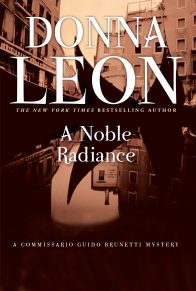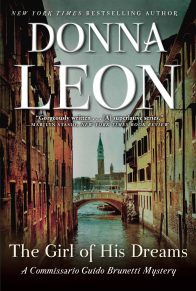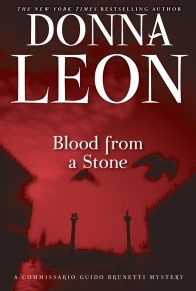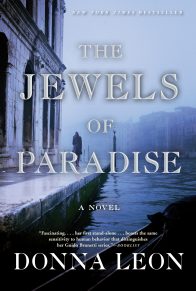When Ispettore Vianello came into his office, Brunetti had all but exhausted the powers of will keeping him at his desk. He had read a report about gun trafficking in the Veneto, a report that had made no mention of Venice; he had read another one suggesting the transfer of two new recruits to the Squadra Mobile before realizing his name was not on the list of people who should read it; and now he had read half of a ministerial announcement about changes in the regulations concerning early retirement. That is, he had read half, if that verb could be applied to the level of attention Brunetti had devoted to the reading of the entire document. The paper lay on his desk as he stared out his window, hoping someone would come in and pour a bucket of cold water on his head or that it would rain or that he would experience the Rapture and thus escape the trapped heat of his office and the general misery of August in Venice.
Deus ex machina, therefore, could have been no more welcome than was Vianello, who came in carrying that day’s Gazzetta dello Sport. “What’s that?” Brunetti asked, pointing to the pink newspaper and giving unnecessary emphasis to the second word. He knew what it was, of course, but he failed to understand how it could be in Vianello’s possession.
The Inspector glanced at the paper, as if himself surprised to see it there, and said, “Someone dropped it on the stairs. I thought I’d take it down and leave it in the squad room.”
“For a minute I thought it was yours,” Brunetti said, smiling.
“Don’t scorn it,” Vianello said, tossing the paper on to Brunetti’s desk as he sat. “The last time I looked at it, there was a long article about the polo teams out near Verona.”
“Polo?” Brunetti asked.
“It seems. I think there are seven polo teams in this country, or maybe that’s only around Verona.”
“With ponies and the white suits and hard hats?” Brunetti could not prevent himself from asking.
Vianello nodded. “There were photos. Marchese this and Conte that, and villas and palazzi.”
“You sure the heat hasn’t got to you and you’re maybe mixing it up with something you might have read in—oh, I don’t know—Chi?”
“I don’t read Chi, either,” Vianello said primly.
“Nobody reads Chi,” Brunetti agreed, for he had never met a person who would confess to doing so. “The information in the stories is carried by mosquitoes and seeps into your brain if you’re bitten.”
“And I’m the one affected by the heat,” Vianello said.
They sat in limp companionship for a moment, neither of them capable of the energy necessary to discuss the heat. Vianello leaned forward to reach behind himself and unstick his cotton shirt from his back.
“It’s worse on the mainland,” Vianello said at last. “The guys in Mestre said it was 41 degrees in the front offices yesterday afternoon.”
“I thought they had air conditioning.”
“There’s some sort of directive from Rome, saying that they can’t use it because of the danger of a brown-out like the one they had three years ago.” Vianello shrugged. “So we’re better off here than in some glass and cement box like they are.” He looked across at the windows of Brunetti’s office, thrown open to the morning light. The curtains moved listlessly, but at least they moved.
“And they really had the air conditioning off?” Brunetti asked.
“That’s what they told me.”
“I wouldn’t believe them.”
“I didn’t.”
They sat quietly until Vianello said, “I wanted to ask you something.”
Brunetti looked across and nodded: it was easier than speaking.
Vianello ran his hand across the surface of the newspaper, then sat back. “You ever,” he began, paused as if trying to find the proper wording, then went on, “Read the horoscope?”
After a moment, Brunetti answered, “Not consciously.” Seeing Vianello’s confusion, he continued, “That is, I don’t remember ever opening the newspaper to look for them. But I do glance at them if someone leaves the paper open to that page. But not actively.” He waited for some sort of explanation; when none was given, he asked, “Why?”
Vianello shifted his weight in his chair, stood to smooth the wrinkles in his trousers, and sat down again. “It’s my aunt, my mother’s sister. The last one left. Anita.
“She reads them every day. Doesn’t make any difference to her if what they predict happens or not, though they never say anything much, do they? ‘You are going to take a trip.’ She goes to the Rialto Market the next day to buy vegetables: that’s a trip, isn’t it?”
Vianello had spoken of his aunt over the years: she was his late mother’s favourite sister and his favourite aunt, as well, probably because she was the most strong-willed person in the family. Married in the fifties to an apprentice electrician, she had seen her husband go off to Torino in search of work within weeks of marrying him. She waited almost two years to see him again. Zio Franco had had good luck in finding work, most of it with Fiat, where he had been able to study and become a master electrician.
Zia Anita moved to Torino to join him and spent six years with him there; after the birth of their first son, they had moved to Mestre, where he set up his own business. The family grew, the business grew: both prospered. Franco had retired only in his late seventies and, much to the surprise of his children, all of whom had grown up on terraferma, moved back to Venice. When asked why none of her children had wanted to move back to Venice with them, she had said, “They had gasoline in their veins, not salt water.”
Brunetti was content to sit and listen to whatever Vianello said about his aunt. The distraction would keep him from going to the window every few minutes to see if … If what? If it had started to snow?
“And she’s started watching them on television,” Vianello continued.
“Horoscopes?” Brunetti asked, puzzled. He watched television infrequently, usually forced to do so by someone else in the family, and so had no idea of what sort of thing was to be found here.
“Yes. But mostly card readers and those people who say they can read your future and solve your problems.”
“Card readers?” he could only repeat. “On television?”
“Yes. People call in and this person reads the cards for them and tells them what they should watch out for, or they promise to help them if they’re sick. Well, that’s what my cousins tell me.”
“Watch out not to fall down the stairs or watch out for a tall, dark-haired stranger?” Brunetti asked.
Vianello shrugged. “I don’t know. I’ve never watched them. It sounds ridiculous.”
“It doesn’t sound ridiculous, Lorenzo,” Brunetti assured him. “Strange, perhaps, but not ridiculous.” He added, “And maybe not even so strange, come to think of it.”
“Why?”
“Because she’s an old woman,” Brunetti said, “and we tend to assume—and if Paola were here, or Nadia, they’d accuse me of prejudice against both women and old people for saying this—that old women will believe that sort of thing.”
“Isn’t that why the witches got burnt?” Vianello asked.
Even though Brunetti had once read long passages of Malleus Maleficarum, he still had no idea why old women had been the specific targets of the burnings. Perhaps because many men are stupid and vicious and old women are weak and undefended.
Vianello turned his attention to the window and the light. Brunetti sensed that the Ispettore wanted no prodding; he would get to whatever it was sooner or later. For the moment, Brunetti let him study the light and used the moment to study his friend. Vianello never bore the heat well, but he seemed more oppressed by it this summer. His hair, slicked down by perspiration, was thinner than Brunetti remembered. And the skin of his face seemed puffy, especially around his eyes.Vianello broke into his observations to ask, “But do you think old women really are more likely to believe in it?”
After considering the matter, Brunetti said, “I’ve no idea. You mean any more than the rest of us?”
Vianello nodded and turned back towards the window, as if willing the curtains to increase their motion.
“From what you’ve said about her over the years, she doesn’t sound the type,” Brunetti eventually said.
“No, she isn’t. That’s why it’s so confusing. She was always the brains in the family. My uncle Franco’s a good man, and he was a very good worker, but he never would have had the idea to go into business for himself. Or the ability to do it, come to that. But she did, and she kept the books until he retired and they moved back here.”
“Doesn’t sound like the sort of person who would begin her day by checking what’s new in the house of Aquarius,” Brunetti observed.
“That’s what I don’t understand,” Vianello said, raising his hands in a gesture of bewilderment. “Whether she is or not. Maybe it’s some sort of private ritual people have. I don’t know, like not going out of the house until you’ve found out the temperature or wanting to know what famous people were born on your birthday. People you’d never suspect. They seem normal in everything, and then one day you discover they won’t go on vacation unless their horoscope tells them it’s all right to go on a journey.” Vianello shrugged, then repeated, “I don’t know.”
“I’m still not sure why you’re asking me about this, Lorenzo,” Brunetti said.
“I’m not sure I know, either,” Vianello admitted with a grin. “The last few times I’ve gone to see her—I try to stop in at least once a week—there were these crazy magazines lying around. No attempt to hide them or anything. ‘Your Horoscope.’ ‘The Wisdom of the Ancients.’ That sort of thing.”
“Did you ask her about them?”
Vianello shook the question away. “I didn’t know how.” He looked across at Brunetti and went on, “And I suppose I was afraid she wouldn’t like it if I did ask her.”
“Why do you say that?”
“No reason, really.” Vianello pulled out a handkerchief and wiped at his brow. “She saw me looking at them—well, saw that I noticed them. But she didn’t say anything. You know, make a joke and say one of her kids left them there or one of her friends had been to visit and had forgotten them. I mean, it would have been normal to say something about them. After all, it was like finding magazines about hunting or fishing or motorcycles. But she was almost—I don’t know—almost secretive about it. I think that’s what bothered me.” He gave Brunetti a long, inquisitive look and asked, “You’d say something, wouldn’t you?”
“To her, you mean?”
“Yes. If she were your aunt.”
“Maybe. Maybe not,” Brunetti said, then asked, “What about your uncle? Can you ask him?”
“I suppose I could, but talking to Zio Franco is like talking to any of those men of his generation: they have to make a joke about everything, slap you on the back and offer you a drink. He’s the best man in the world, but he really doesn’t pay much attention to anything.”
“Not even to her?”
Vianello was silent before he answered, “Probably not.” Another silence, and then he added, “Well, not in a way anyone would recognize. Men of his generation really didn’t pay much attention to their families, I think.”
Brunetti shook his head in a mixture of agreement and regret. No, they didn’t, not to their wives nor to their children, only to their friends and colleagues. He had often thought about this difference in—was it sensibility? Perhaps it was nothing more than culture: surely he knew a lot of men who still thought it a sign of weakness to display any interest in soft things like feelings.
He could not remember the first time it had occurred to him to wonder whether his father loved his mother, or loved him and his brother. Brunetti had always assumed that he had: children did. But what strange manifestations of emotion there had been: days of complete silence; occasional explosive bouts of anger; a few moments of affection and praise when his father had told his sons how much he loved them.
Surely, Brunetti’s father was not the sort of man one told secrets to, or confided in about anything. A man of his time, a man of his class, and of his culture. Was it only manner? He tried to remember how his friends’ fathers had behaved, but nothing came to mind.
“You think we love our kids more?” he asked Vianello.
“More than whom? And who are we?” the Inspector asked.
“Men. Our generation. Than our fathers did.”
“I don’t know. Really.” Vianello twisted round and tugged repeatedly at his shirt, then used his handkerchief to mop at his neck. “Maybe all we’ve done is learned new conventions. Or maybe we’re expected to behave in a different way.” He leaned back. “I don’t know.”
“Why’d you tell me?” Brunetti asked. “About your aunt, I mean.”
“I guess I wanted to hear how it sounded, whether if I listened to myself talk about it, I’d know if I should be worried about her or not.”
“I wouldn’t worry until she starts reading your palm, Lorenzo,” Brunetti said, trying to lighten the mood.
Vianello shot him a stricken look. “Might not be far off, I’m afraid,” he said, failing to make a joke of it. “You think we should drink coffee in this heat?”
“Why not?”













